MusiQ
Erik Satie France Clidat - Loeuvre Pour Piano Piano Works
Table of Contents
Download
Filename: erik-satie-france-clidat-loeuvre-pour-piano-piano-works.rar- MP3 size: 344.4 mb
- FLAC size: 3813.6 mb
Tracks
| Track | Duration | Preview |
|---|---|---|
| Affolements Granitiques | 0:48 | |
| Seul À La Maison | 1:07 | |
| Idylle Cynique | 0:50 | |
| L'Incantation | 4:50 | |
| Tyrolienne Turque | 1:31 | |
| Españaña | 1:22 | |
| Voix D'Intérieur | 0:49 | |
| Ses Jambes | 0:45 | |
| Regrets Des Enfermés | 2:48 | |
| Etre Jaloux De Son Camarade Qui A Une Grosse Tête | 0:51 | |
| Sévère Réprimande | 0:40 | |
| Sports Et Divertissements | 12:23 | |
| Sur Une Lanterne | 1:45 | |
| Petite Ouverture A Danser | 1:30 | |
| De Podophthalma | 1:45 | |
| Sa Taille | 1:05 | |
| Sur Un Casque | 0:46 | |
| Valse Du Chocolat Aux Amandes | 1:00 | |
| Airs À Faire Fuir - S'inviter | 4:35 | |
| Poudre D'or | 4:20 | |
| Sonatine Bureaucratique | 3:20 | |
| Le Porteur De Grosses Pierres | 2:57 | |
| 1ère Pensée Rose + Croix | 1:05 | |
| No. 3 | 2:03 | |
| 4ème Gnossienne | 2:56 | |
| Fantaisie - Valse | 2:08 | |
| La Défaite Des Cimbres | 1:40 | |
| Chez Le Marchand D'Or | 1:57 | |
| No. 1 | 2:55 | |
| Petite Prélude À La Journée | 0:38 | |
| 2ème Sarabande | 4:18 | |
| Berceuse | 1:20 | |
| 5ème Gnossienne | 2:33 | |
| 3ème Sarabande | 4:05 | |
| Danses De Travers | 3:32 | |
| Obstacles Venimeux | 1:27 | |
| Sur Un Arbre | 1:30 | |
| La Vocation | 4:15 | |
| D'Holothnrie | 1:38 | |
| Air De L'Ordre | 3:42 | |
| 6ème Gnossienne | 1:33 | |
| Avec Camaraderie | 0:45 | |
| 4ème Nocturne | 2:02 | |
| 5ème Nocturne | 2:00 | |
| Aubade | 1:20 | |
| 1ère Sarabande | 4:35 | |
| Dur Un Pont | 2:52 | |
| Crépuscule Matinal | 0:52 | |
| Les Pantins Dansent | 1:41 | |
| Danse Cuirassée | 0:45 | |
| "Je Te Veux" - Valse | 4:52 | |
| Airs À Faire Fuir - Modestament | 2:52 | |
| Très Modérément | 1:52 | |
| Passacaille | 2:47 | |
| Songe Creux | 1:42 | |
| No. 2 | 2:27 | |
| Le Piccadilly | 1:20 | |
| Pas Vite | 0:55 | |
| Chanson Canine | 0:50 | |
| Sur Un Mur | 1:55 | |
| D'Edriophthalma | 3:01 | |
| Valse - Ballet | 1:37 | |
| Prélude En Tapissiere | 1:58 | |
| Sur Un Vaisseau | 1:37 | |
| Celle Qui Parle Trop | 0:52 | |
| Son Binocle | 0:58 | |
| Prélude De La Porte Heroique Du Ciel | 3:59 | |
| Ce Que Dit La Petite Princesse Des Tulipes | 0:52 | |
| On Joue | 0:41 | |
| Rêverie De L'Enfance De Pantagruel | 2:00 | |
| Idylle | 0:56 | |
| Airs À Faire Fuir - D'une Manière Très Particulière | 7:10 | |
| Profiter De Ce Qu'il A Des Cors Aux Pieds Pour Lui Prendre Son Cerceau | 0:18 | |
| L'Initiation | 2:55 | |
| 1er Menuet | 3:03 | |
| Lui Manager Sa Tartine | 1:17 | |
| Caresse | 1:17 | |
| Marche Du Grand Escalier | 1:06 | |
| 12 Petits Chorals | 8:05 | |
| Le Chant Guerrier Du Roi Des Haricots | 1:07 | |
| Danse Maigre | 1:16 | |
| Air Du Grand Prieur | 2:51 | |
| Meditation | 0:48 | |
| Air Du Grand Maître | 4:45 |
Video
Satie by France Clidat - Complete Piano Works / Gnossiennes.. + Presentation (Century's recording)
Images
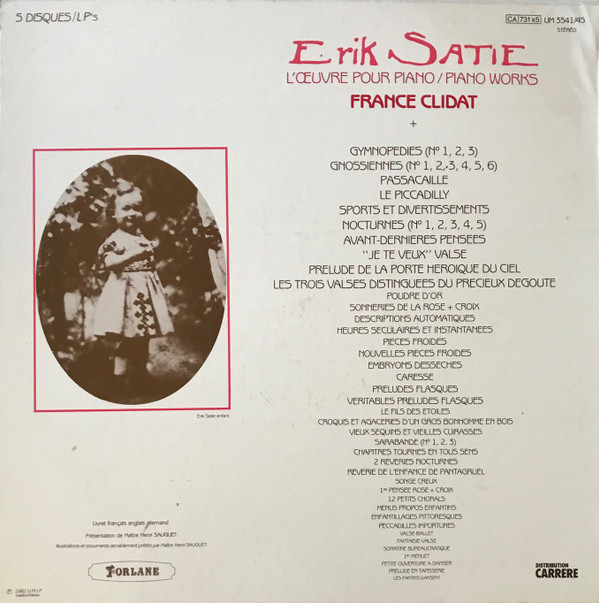
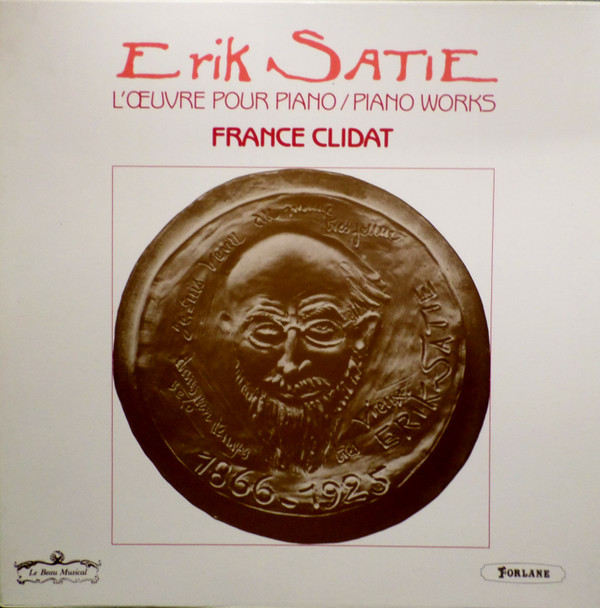
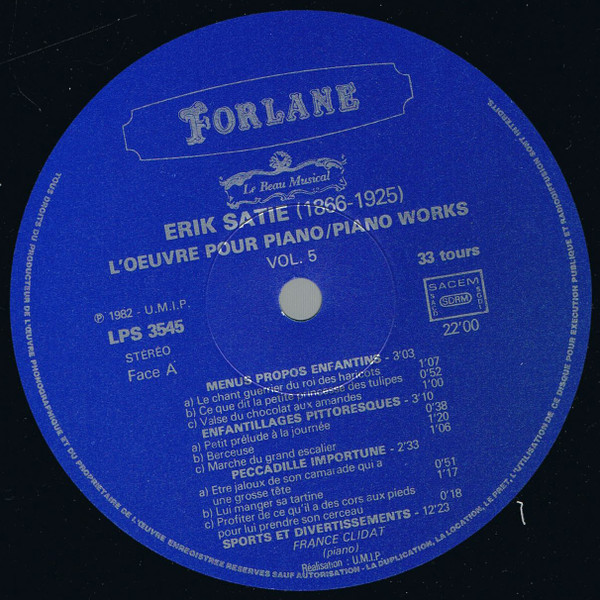
Catalog Numbers
UM 3541/45Labels
ForlaneListen online
- online luisteren
- lytte på nettet
- lyssna på nätet
- ouvir online
- écouter en ligne
- escuchar en línea
- kuunnella verkossa
- ascolta in linea
- online anhören
Formats
- 5 × Vinyl
- LP
Companies
| Role | Company |
|---|---|
| Distributed By | Impogram |
| Phonographic Copyright (p) | U.M.I.P. |
Credits
| Role | Credit |
|---|---|
| Composed By | Erik Satie |
| Piano | France Clidat |
Notes
- ℗ 1982 U.M.I.P.
- Made in France (on the box)
- Made in Holland (on the labels)
Barcodes
Rights Society: STEMRAAbout Erik Satie France Clidat

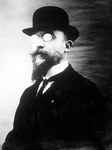
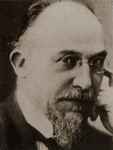



Born: May 17, 1866 (Honfleur, France)
Died: July 1, 1925 (Arcueil, France)
Erik Satie, was a French composer and pianist. A colourful figure in the early 20th century Parisian avant-garde, he referred to himself as a "phonometrograph" or "phonometrician" (meaning "someone who measures (and writes down) sounds"), preferring this designation to that of "musician," after having been called "a clumsy but subtle technician" in a book on contemporary French composers published in 1911. Later, from the 1940s on, predominantly presented Satie's work as that of an inventor of a new and modern musical expression, and so he was slowly rediscovered and became a precursor to artistic movements such as minimalism, repetitive music, ambient (called "Furniture Music" by Satie) and the Theatre of the Absurd. In addition to his body of music, Satie also left a remarkable set of often humorous and witty writings.
Real Name
- Alfred Éric Leslie Satie
Name Vars
- Alfre Leslie Erik Satie
- Alfred Erik Leslie Satie
- E Satie
- E. Sarti
- E. Sati
- E. Satie
- E.Satie
- Eric Sati
- Eric Satie
- Erick Satie
- Erik Alfred Leslie Satie
- Erik Alfredi Le Satie
- Erik Alfredi Leslie Satie
- Erik Saitie
- Erik Satie Et Autres Messieurs
- Satie
- Satie Erik
- Satie, Erik
- Érik Satie
- Сати
- Э. Сати
- Эрик Сати
- ¨êïµÆ£
- ¨êïûµÆ£
- 撜
- µÆ£ü

? Qobuz https://bit.ly/3fWpP2D Deezer https://bit.ly/3an4rPt
? Amazon Music https://amzn.to/3WULSZN Tidal https://bit.ly/3j8cio7
? Spotify https://spoti.fi/3iVxVb7 Apple Music https://apple.co/3flSVWN
? Youtube Music http://bit.ly/3G0EfKw SoundCloud https://bit.ly/3DSoPoM
? Naspter, Pandora, Anghami, LineMusic日本, Awa日本, QQ音乐 …
*Click to activate the English subtitles for the presentation* (00:00-05:42)
Gymnopédies (00:07)
Nocturnes (07:47)
Gnossiennes (14:36)
Avant-dernières pensées (21:55)
‘’Je te veux’’ valse (25:10)
Prélude de la porte héroïque du ciel (30:09)
Les trois valses distinguées du précieux dégoûté (34:15)
Poudre d’or (37:14)
Sonneries de la rose croix (41:39)
Descriptions automatiques (53:05)
Heures séculaires et instantanées (57:23)
Pièces froides (1:00:41)
Pièces froides (1:07:44)
Nouvelles pièces froides (1:11:23)
4e Gnosienne (1:17:49)
5e Gnosienne (1:20:49)
6e Gnosienne (1:23:25)
Embryons desséchés (1:25:04)
Caresse (1:31:39)
Préludes flasques (1:33:02)
Véritables préludes flasques (1:36:27)
Les fils des étoiles (1:39:06)
Croquis et agaceries (1:51:10)
Vieux séquins et vieilles cuirasses (1:55:27)
1er Sarabande (1:59:58)
2e Sarabande (2:04:35)
3e Sarabande (2:08:57)
Chapitres tournes en tous sens (2:13:06)
4e Nocturne (2:19:53)
5e Nocturne (2:22:04)
2 Reveries nocturnes (2:24:12)
Reverie de l’enfance de pantagruel (2:27:08)
Songe creux (2:29:13)
1er Pensee rose et croix (2:31:01)
12 Petits chorals (2:32:18)
Menus propos enfantins (2:40:26)
Enfantillages pittoresques (2:43:37)
Peccadille importune (2:46:55)
Sports et divertissements (2:49:36)
Valse - ballet (3:01:53)
Fantaisie - valse (3:03:38)
Sonatine bureaucratique (3:05:53)
1er Menuet (3:09:19)
Petite aventure a danser (3:12:27)
Prelude en tapisserie (3:14:02)
Les pantins dansent (3:16:05)
Passacaille (3:17:54)
Le piccadilly (3:20:44)
Piano : France Clidat
Recorded in 1979
Grand Prix du Disque
? FOLLOW US on SPOTIFY (Profil: CMRR) : https://spoti.fi/3016eVr
? Download CMRR's recordings in High fidelity audio (QOBUZ) : https://bit.ly/2M1Eop2
L'image la plus importante que la postérité a retenu de Satie est celle d'un humoriste. Un compositeur fantasque voué à la provocation. L'extravagance et même l'audace, tant dans sa musique que dans son comportement. Nombre des titres qu'il a donnés à ses compositions pour piano ont eu tendance à accentuer encore cette réputation. Un musicien qui a composé comme "Airs à faire fuir